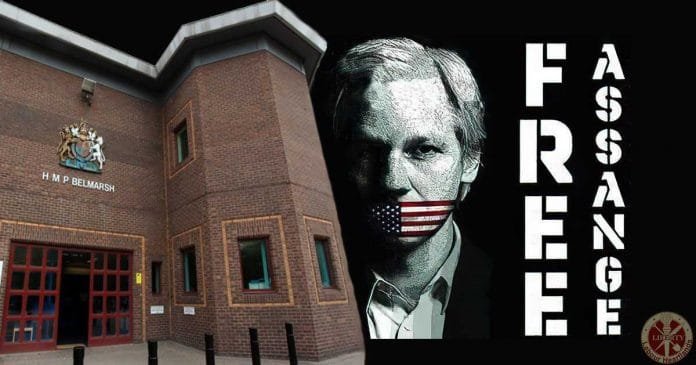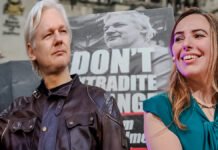WikiLeaks founder Julian Assange has been denied bail today following Monday’s verdict in his battle to against extradition from Britain to the United States.
“I am satisfied there are substantial grounds for believing that if Mr Assange is released today he would fail to surrender to court to face the appeal proceedings,” Judge Vanessa Baraitser said.
“As far as Mr Assange is concerned this case has not yet been won… the outcome of this appeal is not yet known.”
She was referring to the fact that Assange after failing in his battle against extradition to Sweden, breached bail and took refuge in the Embassy of Ecuador in London in June 2012. He was granted asylum by Ecuador on the grounds of political persecution, with the presumption that if he was extradited to Sweden, he would be eventually extradited to the US.
These allegations where all dropped in 2019
On 11 April 2019, Assange’s asylum was withdrawn following a series of disputes with the Ecuadorian authorities. The police were invited into the embassy, and he was arrested.
He was found guilty of breaching the Bail Act and sentenced to 50 weeks in prison. The United States government unsealed an indictment against Assange, related to the leaks provided by Chelsea Manning. On 23 May 2019, the United States government further charged Assange with violating the Espionage Act of 1917.
The investigation into Assange was reopened in May 2019 following his dramatic removal from Ecuador’s embassy in central London the previous month. Swedish authorities had previously suspended the probe in 2017.
In November 2019 Sweden dropped the rape allegations and the investigation, deputy director of public prosecution Eva-Marie Persson making the announcement at a news conference in Stockholm.
Although officials said they believed the women’s claims to be “credible,” they have now said that there does not appear to be enough evidence for an indictment. This follows a June decision by a Swedish court that Assange should not be detained.
The Americans claim Assange’s receipt and publishing of tens of thousands of classified military and diplomatic documents about the Iraq and Afghanistan wars put lives in danger.
The raw data appeared on the WikiLeaks website in 2010, while edited versions were published in newspapers, including the UK’s Guardian who subsequently has done nothing to support Julian Assange.
Extradition refused
On Monday district Judge Vanessa Baraitser ruled that while US prosecutors met the tests for Mr Assange to be extradited for trial, the US was incapable of preventing him from attempting to take his own life.
She outlined evidence of his self harm and suicidal thoughts and said: “The overall impression is of a depressed and sometimes despairing man fearful for his future.”
She said: “Faced with the conditions of near total isolation without the protective factors which limited his risk at HMP Belmarsh, I am satisfied the procedures described by the US will not prevent Mr Assange from finding a way to commit suicide and for this reason I have decided extradition would be oppressive by reason of mental harm and I order his discharge.”
Right result wrong reason
The request to extradite Julian Assange should have been refused for so many other reasons, not least to protect investigative journalism, free speech, freedom of the press along with the rights of journalists to act on information brought by whistleblowers, information that brought to light wrongdoing by governments who attempt to cover-up crimes and murder of committed by its military’s actions in the people’s name. Actions that resulted in the killing more than a dozen innocent Iraqis, including two Reuters journalists.
The footage leaked by private Manning led to global outrage, reigniting a debate over the US’s occupation of Iraq and wider presence in the Middle East.
Julian Assange has been a remand prisoner for over 400 days when the guidelines state nobody in the UK should be kept on remand for more than 180 days.
Freedom of expression is a universal human right. It is not the prerogative of the politician. Nor is it the privilege of the journalist. In their day-to-day work, journalists are simply exercising every citizen’s right to free speech. A free press is fundamental to a democratic society. It seeks out and circulates news, information, ideas, comment and opinion and holds those in authority to account. The press provides the platform for a multiplicity of voices to be heard. At national, regional and local level, it is the public’s watchdog, activist and guardian as well as educator, entertainer and contemporary chronicler.
Help Us Sustain Ad-Free Journalism
Sorry, I Need To Put Out the Begging Bowl
Independent Journalism Needs You
Our unwavering dedication is to provide you with unbiased news, diverse perspectives, and insightful opinions. We're on a mission to ensure that those in positions of power are held accountable for their actions, but we can't do it alone. Labour Heartlands is primarily funded by me, Paul Knaggs, and by the generous contributions of readers like you. Your donations keep us going and help us uphold the principles of independent journalism. Join us in our quest for truth, transparency, and accountability – donate today and be a part of our mission!
Like everyone else, we're facing challenges, and we need your help to stay online and continue providing crucial journalism. Every contribution, no matter how small, goes a long way in helping us thrive. By becoming one of our donors, you become a vital part of our mission to uncover the truth and uphold the values of democracy.
While we maintain our independence from political affiliations, we stand united against corruption, injustice, and the erosion of free speech, truth, and democracy. We believe in the power of accurate information in a democracy, and we consider facts non-negotiable.
Your support, no matter the amount, can make a significant impact. Together, we can make a difference and continue our journey toward a more informed and just society.
Thank you for supporting Labour Heartlands












